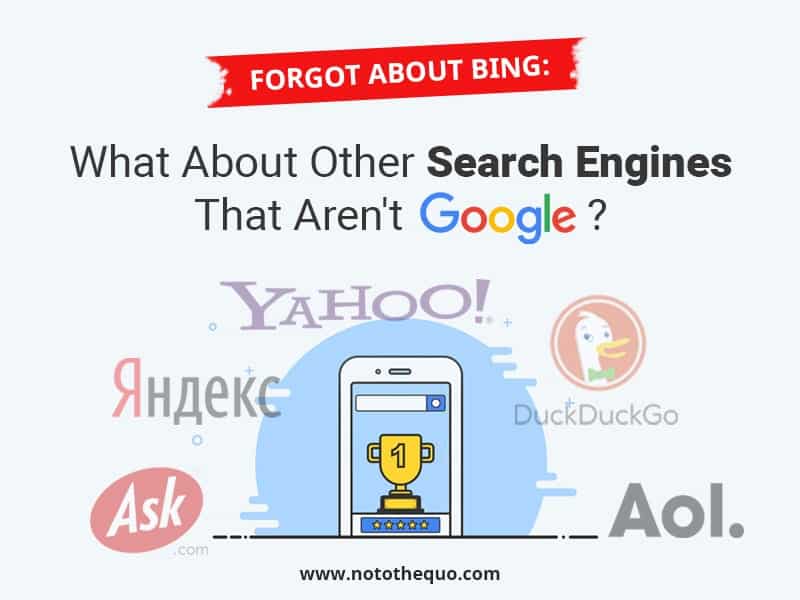Forgot About Bing: What About Search Engines That Aren’t Google?
It’s hard to believe but Google has been with us since the mid 1990s. Since then, Google has become the undisputed leader in search. Nobody bats an eye when we use “Google” as a verb in casual conversations. For some of us, our jobs are primarily built on learning how to leverage Google’s tools to start and grow businesses.
But Google doesn’t own the entire search engine marketshare.
It’s true: when we talk about SEO, we’re always talking about Google, but they’re hardly the only search engine on the block.
If you’ve been solely focused on Google for SEO, you might be missing huge opportunities for ranking highly in alternative search engines. But you may be wondering, how should sites like Bing and Yahoo factor in to my SEO strategy and how much should I be catering to them? We examine their value in this post.
Yes, Bing and Yahoo are Important for SEO (Probably)
Let’s face it: even your grandfather knows what it means “to Google” something. It goes without saying that Google is the big fish in the search engine pond, but Bing and Yahoo should play important roles in your overall SEO strategy… probably.
Here’s what I mean: Bing and Yahoo have some degree of importance for every digital marketer, but depending on your industry, Bing and Yahoo might play an outsized role in your SEO strategy.
This is one of those times that it’s absolutely vital that you know exactly who you’re marketing to. Bing — and by extension Yahoo — has an older, more affluent user base than Google. At the time of writing, more than 33% of Bing users have a household income of $100,000 or more and over a third of Bing’s users graduated with a bachelor’s degree.
Depending on your industry, that may make Bing much more attractive than Google.
What kinds of industries should consider making Bing SEO and pay-per-click advertising a central part of their digital strategy? Primarily, B2B companies. Since Microsoft owns Bing, and Microsoft is still king when it comes to enterprise software, it’s easy to assume that Bing is probably the default browser on a Windows machine.
The Bing and Yahoo Search Secret Your Competitors Don’t Know About
When it comes to Bing and Yahoo searches, you have a distinct advantage over your competition, one that they they aren’t thinking about.
Again, probably.
The fact is, most digital marketers just aren’t spending time doing SEO strictly for Bing and Yahoo searches.
They don’t have the time. They don’t have the bandwidth.
They’re simply playing a numbers game, hoping that the SEO work they’re doing for Google will also work for Bing and Yahoo.
That’s a huge opportunity for you.
In addition to the work you’re doing to optimize your pages for Google, spend some time learning how Bing and Yahoo serve up search results. And you can even spend some time figuring out how Bing and Yahoo search ads work.
Again, because most digital marketers solely focus on Google, you don’t have nearly as much competition on Bing and Yahoo. That means it’s less competitive and more cost-effective. It also means that you’ll pay less for advertising. A 2013 AdGooroo study found that Bing’s average cost-per-click was $0.76 less expensive than Google’s.
If you can take advantage of your competitors’ disinterest or inability to take advantage of these search engines, optimizing for Bing and Yahoo could be a game changer for your business.
Here’s How Much Attention You Should Focus on Bing and Yahoo
We’ve established that you (probably) should be spending more time and effort on SEO work for Bing and Yahoo, but you might be wondering just how much time you should be spending on these search engines.
The truth is, there’s no magic amount of Bing and / or Yahoo optimization that’s going to work for everyone. It’s important that you really know your audience and the kinds of ways they use search engines to find results.
As mentioned earlier — generally speaking — Bing users are typically older and more affluent than Google users — if the older, more established crowd are in your target demographic, Bing might make up a bigger part of your company’s SEO portfolio than other companies that skew toward younger demographics.
While it’s important to be a player on all search engines, consider where you can make the biggest impact with the least amount of effort. Ranking on the first page of Bing or Yahoo might not be as prestigious as ranking on the first page of Google, but if it’s a relatively easy win and makes sense for your business, you should make it a priority.
Google might be a household name, but there’s money to be made with non-Google search engines, specifically Bing and Yahoo.
Before ignoring the second tier search engines, spend some time thinking about how your personas use social engines, where they live, what they’re doing when they’re searching and on what platforms and / or devices they’re using when they search. Together, all of these things start to illustrate a detailed picture of your target user that you can use to be a better digital marketer.
SEO No To The Quo



